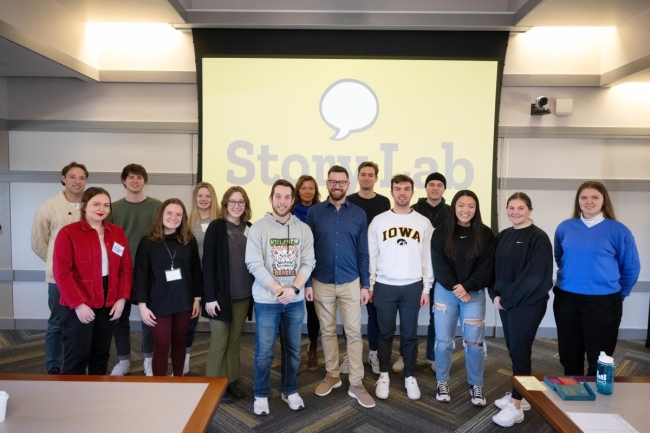You have /5 articles left.
Sign up for a free account or log in.

Nick Westergaard (middle in blue) and his students at the kickoff workshop.
Justin Torner
As students at the University of Iowa’s Tippie School of Business prepare to embark on their careers, a new program is teaching them to tell their stories and personal experiences—a communication skill that will be important during their initial job searches and beyond. Story Lab was created by the Tippie Leadership Collaborative, housed in the Department of Management and Entrepreneurship, a resource hub for organizations seeking management expertise. The semester-long program involves a workshop, peer coaching and a networking event featuring participants’ stories.
The need: Nick Westergaard, a lecturer of management and entrepreneurship and program lead, says storytelling helps business leaders more effectively make their case to employees or investors by creating an emotional connection. The Story Lab idea sparked when he had a conversation with Stephen Courtright, director of the leadership collaborative, about ways for students to have a “foundational building block” to leadership. “Students and leaders … need to stand up and ultimately tell their story. [That] is how the idea of Story Lab was born,” he says.
“Storytelling is a big part of how I teach communication, in terms of the science of storytelling and its ability to persuade and move people,” Westergaard shares. And it’s a good fit for the University of Iowa over all, since communication “is really baked into our approach across colleges, from the Writers’ Workshop, sciences, health care and business,” he adds.
Plus, research has shown that people are more likely to remember statistics and facts if they’re presented within a story.
Storytelling was one of the original communication strategies used by mankind, and the role of storytelling in leadership has been connected to leadership effectiveness, according to a study published in a 2018 issue of the Journal of Leadership Education.
Lab work: The lab, launched with funding from the collaborative’s executive education program, starts with a daylong storytelling kickoff workshop where the instructors help students develop quick story and leadership skills through immersive activities. Participants learn the basics of storytelling, receive feedback from a member of the institution’s management faculty and get guidance from peer mentors as they develop their ideas. How to Tell a Story, published by The Moth, a nonprofit organization dedicated to the art and craft of storytelling, serves as the course textbook.
A showcase at the MERGE innovation hub in downtown Iowa City, with members of the local business community and the general public invited, is being planned for the end of the semester. Working with the theme “Future Tense,” each student will share a short story about a time when everything seemed mapped out and share about turning points, taking a path less traveled or starting over again in moving toward or away from a goal.
What the future holds: In business, leaders often try to mobilize people to work toward a common goal, Courtright says. “It’s really important for leaders to gain the credibility of those that they’re leading. Storytelling about oneself is a way for people to gain credibility.”
Courtright launched the Tippie collaborative in 2020 to provide customized training to managers and employers. He says storytelling come up frequently when speaking with organizations about what skills business leaders need. “We had the funding for it, we had the capability for it. And it’s a real strategic advantage for the students,” Courtright says.
Honing Storytelling Skills Further
Chicago-based Leadership Story Lab is one place people already established in their careers can connect with to build the tools to tell stories, which can set anyone apart as a persuasive leader. The firm promotes the ability to “stand out in the interview process, add punch to presentations, making compelling cases for new initiatives and build your team.” Online business storytelling coaching is also offered.
Storyteller experiences: “One thing that I’m hearing in terms of reactions from students is the experience of having a new network and cohort of people they now have a deeper connection with because they’ve each told their stories,” Courtright explains.
Drew Jauron, a junior studying management, is one of the 15 students initially enrolled in the program. He says the course reminds him of all the experiences he can speak on and how to do so in an engaging way, so that people understand him better, both in business and in his personal life. Jauron believes this course will allow him to become a relatable business leader.
“I’m an individualist, at least before this experience, in terms of just knowing what I can do,” says Jauron. “But other people don’t always understand that, so you have to teach them about yourself, and that’s a part of storytelling.”
Tell us about a new initiative at your institution that promotes success in their academic life, in the campus experience, related to health and wellness, or to prepare for life after college.




